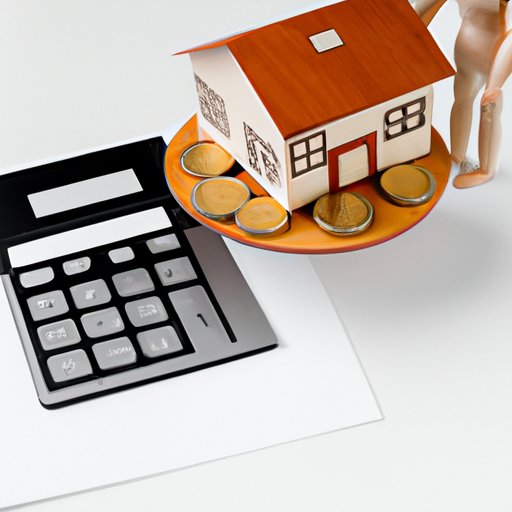Introduction
Figuring out how much home you can afford is an important step in the home-buying process. While it’s easy to get caught up in the excitement of house hunting, it’s important to stay grounded in reality. Knowing how much home you can afford will help you narrow down your search and make sure you don’t end up over-extending yourself financially.
Home affordability is determined by a number of factors, including your income, monthly housing costs, debt-to-income ratio, closing costs, down payment, property taxes and insurance, and other expenses and financial obligations. This article will provide an overview of each of these factors, and offer a step-by-step guide to calculating how much home you can afford.

Calculating How Much Home You Can Afford Based on Your Income
Before you can begin to calculate how much home you can afford, you need to understand your income. Make sure you have a good understanding of your current income, as well as any potential increases or decreases in the future. Additionally, consider any other sources of income you may have, such as rental income or alimony payments.
Once you have a clear understanding of your income, you can start to estimate your monthly housing costs. This includes the cost of the mortgage principal and interest, property taxes, homeowner’s insurance, and any other applicable fees and charges. When estimating these costs, it’s important to keep in mind that they will likely increase over time, so factor in some extra cushion.
In addition to your income and monthly housing costs, another important factor to consider when determining how much home you can afford is your debt-to-income ratio. Your debt-to-income ratio is the amount of your total monthly debt payments compared to your gross monthly income. It is typically expressed as a percentage, and lenders use this figure to determine whether or not you qualify for a loan.
Budgeting for a Home Purchase: How to Determine What You Can Afford
When budgeting for a home purchase, it’s important to factor in all of the associated costs. This includes any closing costs, which are typically 2-5% of the purchase price; a down payment, which is typically 20%; and ongoing costs such as property taxes and insurance. It’s also important to factor in any additional costs associated with the home, such as repairs, maintenance, and renovations.
It’s also important to understand the cost of living in the area you’re considering. Research the average cost of rent and utilities, groceries, transportation, and entertainment in the area, and compare that to your own income. This will give you a better sense of what you can expect to pay for a home in the area.

A Guide to Estimating How Much Home You Can Afford
Once you’ve gathered all of the necessary information, you can start to calculate how much home you can afford. Start by comparing your income to the cost of living in the area. This will give you a good idea of the maximum home price you can afford. Next, adjust for any other expenses and financial obligations, such as credit card debt, car payments, student loan payments, and any other recurring costs.
Finally, use your debt-to-income ratio to determine your maximum monthly mortgage payment. Your lender will use this number to determine whether or not you qualify for a loan, so it’s important to be accurate. To calculate your debt-to-income ratio, add up all of your monthly debt payments (such as credit card payments and auto loans) and divide them by your gross monthly income.

Building a Financial Plan for Home Ownership: Determining What You Can Afford
Once you’ve determined how much home you can afford, it’s time to start building a financial plan for home ownership. Start by assessing your creditworthiness. Your credit score will play an important role in determining the terms of your loan, so it’s important to get a copy of your credit report and make sure everything is accurate.
Next, shop around for mortgage loans. Compare different lenders and their offerings, and make sure to ask questions about fees, interest rates, and repayment terms. Finally, make sure to plan ahead for home maintenance and repairs. Set aside money in a savings account for any unexpected expenses that may arise, and make sure to factor this into your budget.
Understanding Your Debt-to-Income Ratio: A Step-by-Step Guide to Calculating How Much Home You Can Afford
Your debt-to-income ratio is one of the most important factors when it comes to determining how much home you can afford. To calculate your debt-to-income ratio, start by adding up all of your monthly debt payments (such as credit cards, auto loans, and student loans). Then, divide that number by your gross monthly income. The resulting figure is your debt-to-income ratio.
Once you’ve calculated your debt-to-income ratio, you can use it to determine your maximum monthly mortgage payment. Lenders typically prefer a debt-to-income ratio of 36% or less, so make sure to factor this into your calculations. Additionally, if you have a higher debt-to-income ratio, you may need to put down a larger down payment or look for a lower-cost home.
Conclusion
Figuring out how much home you can afford can be a daunting task, but it’s an important step in the home-buying process. Start by gathering all of the necessary information, such as your income, monthly housing costs, closing costs, and debt-to-income ratio. Then, use this information to estimate how much home you can afford. Finally, assess your creditworthiness and shop around for mortgage loans to ensure you get the best terms possible.
(Note: Is this article not meeting your expectations? Do you have knowledge or insights to share? Unlock new opportunities and expand your reach by joining our authors team. Click Registration to join us and share your expertise with our readers.)
